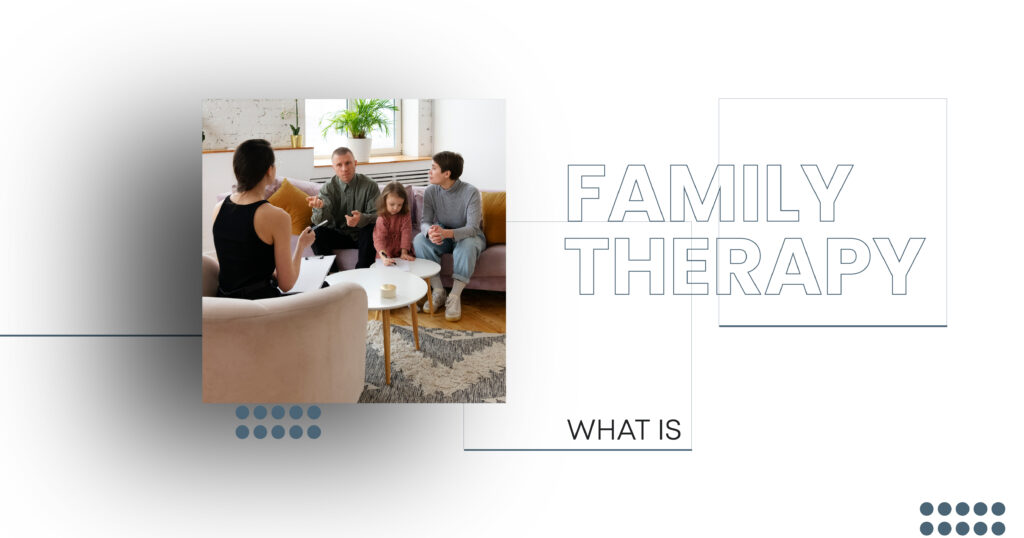Family therapy, also known as family counseling or couple and family therapy, is a specialized form of psychotherapy that aims to address specific issues affecting the health and functioning of a family unit. It is rooted in the belief that families are systems of interconnected individuals, and problems within this system can manifest in various ways, affecting the well-being of each member. In this blog post, we will delve into what family therapy entails, its benefits, who might benefit from it, and how it differs from individual therapy.
What Is Family Therapy?
Family therapy is a therapeutic approach that focuses on improving communication and resolving conflicts within family relationships. It recognizes that individual problems often stem from or are influenced by the dynamics of the family unit. By involving all members of the family in therapy sessions, including parents, children, and sometimes extended family members, therapists aim to identify and address issues that contribute to tension, stress, or dysfunction.
Mental Health Center of San Diego
How Does Family Therapy Work?
Family therapists are trained to facilitate discussions that help family members understand each other better, communicate more effectively, and work collaboratively to solve problems. The process typically involves:
- Assessment: The therapist meets with the family to understand their dynamics, relationships, and issues they are facing.
- Goal Setting: Specific goals for therapy are established, such as improving communication, resolving conflicts, or addressing behavioral issues.
- Intervention: Therapists employ various techniques such as role-playing, communication exercises, and systemic interventions to foster healthier interactions and relationships.
- Follow-up and Evaluation: Progress is monitored, and adjustments to therapy goals and techniques are made as needed.
Types of Issues Addressed in Family Therapy
Family therapy can be beneficial for addressing a wide range of issues, including:
- Communication Problems: Improving how family members talk to each other and express their thoughts and feelings.
- Conflict Resolution: Resolving disputes and disagreements in a constructive manner.
- Behavioral Issues: Addressing behavioral problems in children or adolescents, such as defiance or acting out.
- Life Transitions: Helping families adjust to major life changes such as divorce, remarriage, or the birth of a new child.
- Mental Health Issues: Supporting families dealing with mental health disorders such as depression, anxiety, or addiction.
Who Can Benefit from Family Therapy?
Family therapy is suitable for various situations and individuals, including:
- Families in Conflict: Families experiencing persistent conflicts or tensions that affect relationships and daily life.
- Couples and Parents: Couples facing challenges in their relationship or parenting disagreements.
- Children and Adolescents: Younger family members dealing with behavioral issues, academic problems, or emotional difficulties.
- Blended Families: Families navigating the complexities of step-parenting and integrating new family members.
Mental Health Center of San Diego
How Is Family Therapy Different from Individual Therapy?
While individual therapy focuses on the personal growth and well-being of one individual, family therapy views problems within the context of the family system. Here are some key differences:
- Focus: Individual therapy focuses on the individual’s thoughts, emotions, and behaviors, while family therapy considers how these are influenced by and influence family dynamics.
- Participants: In individual therapy, there is typically only one client (the individual seeking therapy), whereas family therapy involves multiple family members.
- Goals: Individual therapy goals often center around personal growth and self-awareness, while family therapy goals focus on improving family relationships and dynamics.
Benefits of Family Therapy
Family therapy offers several benefits that contribute to overall family well-being:
- Improved Communication: Enhanced communication skills help family members express themselves more effectively and understand each other better.
- Conflict Resolution: Techniques learned in therapy can help families resolve conflicts in healthier, more productive ways.
- Support System: Therapy provides a supportive environment where families can openly discuss issues and receive guidance from a trained professional.
- Behavioral Changes: Positive changes in family dynamics can lead to improvements in individual behaviors and relationships.
Common Techniques Used in Family Therapy
Family therapists employ various techniques to facilitate healing and growth within the family unit:
- Structural Therapy: Focuses on adjusting family roles and boundaries to improve functioning.
- Strategic Therapy: Emphasizes problem-solving and goal-setting through specific therapeutic tasks.
- Narrative Therapy: Helps families rewrite negative narratives and create more positive, empowering stories.
- Systemic Interventions: Techniques that address patterns of behavior and interaction within the family system.
Is Family Therapy Right for You?
If you are experiencing challenges in your family relationships or individual behaviors that seem intertwined with family dynamics, family therapy may be beneficial. Consider seeking the support of a qualified family therapist who can help you navigate these issues and foster healthier relationships within your family.
Mental Health Center of San Diego
Conclusion
Family therapy is a valuable resource for families facing challenges that affect their relationships and overall well-being. By addressing issues within the context of the family system and employing specialized therapeutic techniques, family therapists help families communicate effectively, resolve conflicts, and support each other through difficult times. Whether you are dealing with communication breakdowns, behavioral issues, or major life transitions, family therapy offers a supportive environment where you can work together to create positive changes and strengthen your family bonds.
In conclusion, understanding family therapy involves recognizing its role in fostering healthier relationships and improving the overall quality of family life. If you are considering family therapy, reach out to a qualified therapist who can guide you through this process and help your family thrive.
By crafting this comprehensive guide to family therapy, we aim to provide valuable insights and information that surpasses existing content on the topic, ensuring that our readers are well-informed and empowered to make informed decisions about their family’s well-being.









